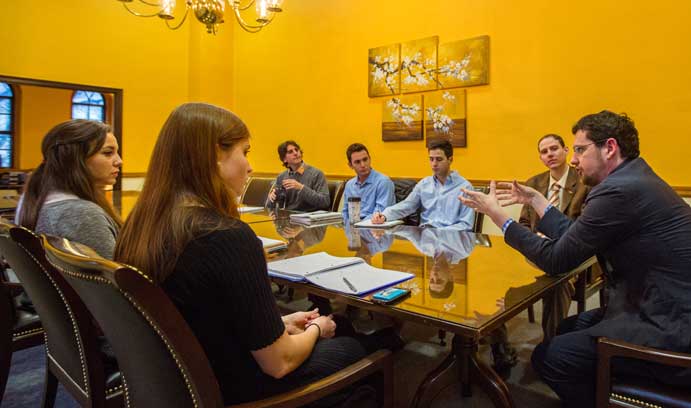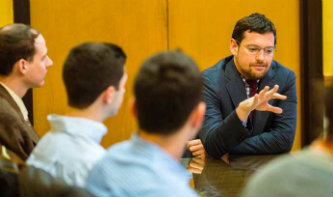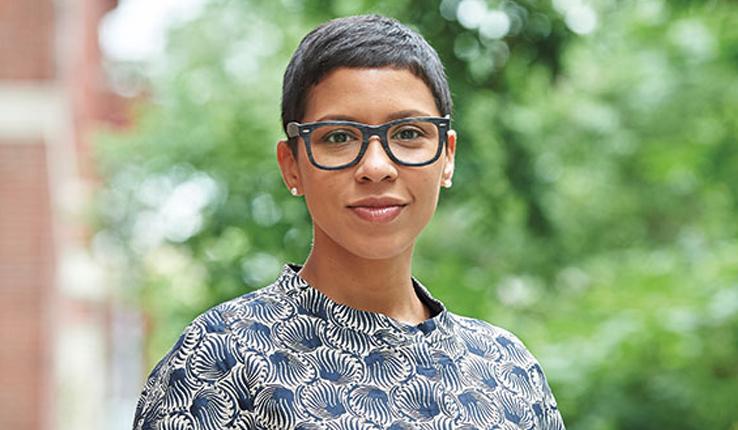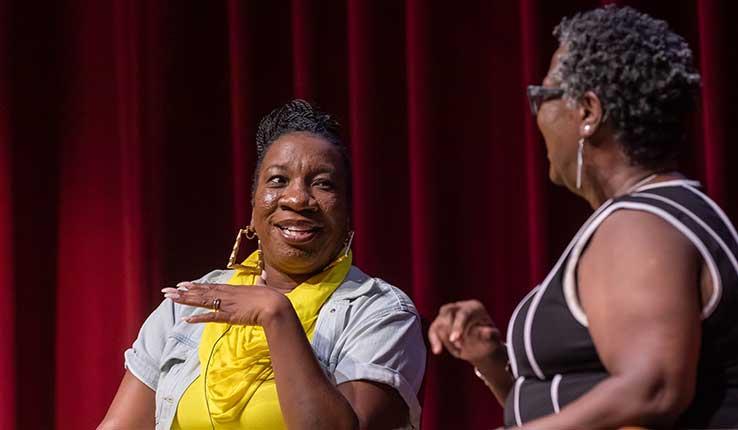Digital Privacy Expert Warns of Threat of an Authoritarian State

A digital privacy expert warned his Lehigh audience that the architecture of an authoritarian state is already in place in the United States, and it’s only a matter of time “before someone decides to switch it on.”
We’re relying upon political systems to regulate, “and to be able to process the incredible complexity of these emerging technologies,” said Cato Institute Senior Fellow Julian Sanchez. “Given the speed with which courts have responded to new technologies, I don’t have a lot of confidence that the Fourth Amendment will be effective in terms of checking abuse, and I wonder if our liberal democracy can actually be sustained.”
Sanchez—considered one of the nation’s foremost authorities on electronic surveillance and the Fourth Amendment—was on campus in early April to deliver the Tresolini Law Lecture. The annual event was established in 1978 to honor the legacy of one of Lehigh’s most respected and beloved educators, Rocco Tresolini, who served as a professor and chair of the department of government.
Looking back on the both the technological advances and the political decisions that brought us to this point, Sanchez identified key pivot points in the history of government surveillance, dating back to the turn of the last century in the landmark Olmstead v. United States case.
In that case, a former Prohibition-era Seattle Police Department Lieutenant-turned-bootlegger challenged his conviction for conspiracy to violate the National Prohibition Act, which came about largely on evidence collected through wiretapping.
Olmstead’s attorneys argued that the evidence against their client had been obtained without a warrant and that it violated his constitutional right to privacy. Although the Supreme Court upheld the conviction in 1928, the case produced a prescient warning in the dissenting opinion written by Justice Louis Brandies, who warned of the government’s potential for far-reaching means to invade the privacy of its citizens.
“Brandeis saw that the decision was short-sighted and myopic, and that view has been vindicated,” Sanchez said.
It took 40 years before the Supreme Court recognized their error, Sanchez said, representing a long-standing pattern of the law lagging behind technology.
Information collected through surveillance was most notably put to use in world wars, in an FBI-led attempt to discredit civil rights icon Martin Luther King, in presidential administrations, and more aggressively in the post 9-11 political climate.
Sanchez cited initiatives such as Stellar Wind, the code name given to a surveillance program unveiled by the Bush administration shortly after the September 2001 attacks, which served as a legal foundation for more expansive data collection and surveillance programs such as the warrantless collection of phone conversations.
Abuses of this technology, in Sanchez’s view, justified concerns raised by whistleblower Edward Snowden, the former CIA employee and government contractor who leaked classified information from the National Security Agency in 2013. The documents unveiled a number of global surveillance programs run in concert with other governments and telecommunications corporations.
“This almost completely indiscriminate gathering of bulk data provides the ability to search through that data and locate certain Americans, for example,” he said. “Snowden worried about the NSA’s ability to collect that information, and it lowered the bar for a dangerous authoritarian state with no restraints on access. It could disregard the rules put in place and do so in secret.
“This is about the world we are already living in and will move more deeply into within the next decades,” said Sanchez, before listing the ways that American citizens have willingly compromised their privacy. Just two examples are phones that don’t protect data and can allow others to correlate the user’s movements, and home devices that are “always on listen,” he said.
These technological advances have, in effect, “created a world permeated by networked computing devices at a level that is unprecedented. More chilling,” he said, “it makes it possible to be able to determine, for example, where people are who are saying negative things about this president. And then to be able to ask, what kind of person is likely to say bad things about this president?”
At no point in our history, Sanchez said, did we have the level of information that is so routinely accessible, aggregable and searchable. Before, “it was always practically impossible to have this level of surveillance, which is necessary for a police state. For the first time, we’ve brought in the technological architecture, if not the political architecture at this point.”
Following his talk, Sanchez responded to audience questions about current cases challenging government and corporate authority over the private data of individuals. Earlier in the day, he met with a group of political science students to discuss these issues in more depth.
Sean Beienburg, assistant professor of political science who organized this year’s talk, said that when the topic of electronic surveillance was decided last year, “Sanchez was the first name to come to my mind.”
In his introduction of Sanchez, Beienburg also acknowledged the members of the Tresolini family in the audience and thanked them for their support of the lecture series that has brought an impressive list of speakers to Lehigh, which included legendary journalist Bill Moyers, public intellectual Cornel West, former U.S. Attorney General Janet Reno, and late Supreme Court Justice Antonin Scalia.
After the lecture, Beienburg said, “It was an often bracing talk, delivering a critical message about the fragility of our Fourth Amendment liberties in light of technological development, and the need for our vigilance in jealously guarding them. I'm so glad he gave this terrific lecture—but wish he didn't have to."
Posted on:





